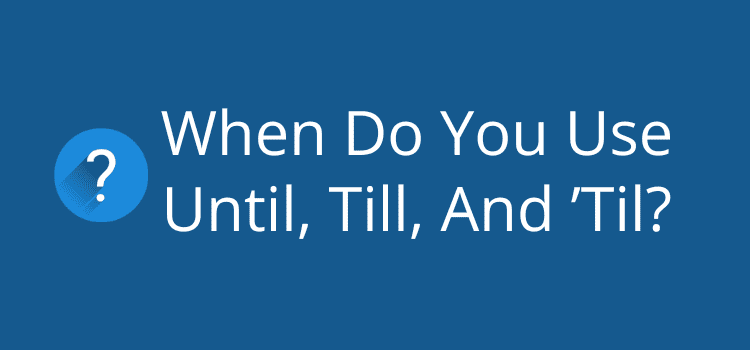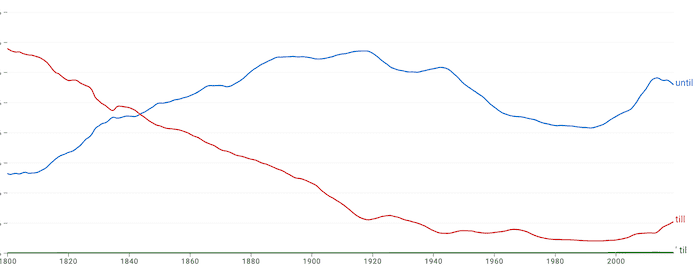
The words, until, till, and ’til, and even ‘till, often confuse writers, even though they are very common words we use in writing.
Which ones are right, and how do you use them correctly?
In most cases, the words are prepositions and share the same or similar meaning of saying up to a certain point in time.
But with the contracted forms, you need to take a little extra care. Most times, until is the best and clearest choice. However, if you want to use the different forms, let’s look at each variation in more detail.
What does until mean, and how do we use it?
Until is the most common form to use in writing. The word generally means up to a point in time or a mentioned event.
It can be a preposition or a conjunction to introduce a subordinate clause.
Here are some quick examples.
Preposition. (Indicating a point in time or a distance)
We waited until 10:00 p.m. before they finally arrived.
John doesn’t leave the office until he finishes his work.
Conjunction. (Connecting two clauses)
I assure you, I won’t talk to him again until he apologizes.
You won’t believe it until you see it for yourself.
Whatever your form or style of writing, until is usually the best option because it’s clear and easy to understand.
When do we use till?
Till is a synonym of until and shares the same meaning and usage as a preposition and conjunction.
In other words, it’s 100% interchangeable.
You can see from this usage graph how until has replaced till in usage since the mid-1800s.

Clearly, up to 1840, till was in more common use before being overtaken by until.
From that fact, you might think that till is a more formal word.
But interestingly, the Oxford Dictionary states the opposite.
“The main difference is that till is generally considered to be more informal than until.”
However, you often find the word till in modern use, especially in music and entertainment.
One of the main reasons is that it is only one syllable and can better fit a meter or rhythm.
Here are some famous examples.
Till Death Us Do Part: A British television sitcom aired on BBC from 1965 to 1975.
From Dusk Till Dawn: An American horror television series.
Till There Was You: A song by The Beatles.
Till We Meet Again: A popular song written during the Great War that tells of the parting of a soldier and his sweetheart.
Using till in writing
While not as common as until, using till instead is fine.
It may seem old-fashioned or informal now, but it has uses and can add variety to your writing.
The following examples show how you can use it.
Jimmy always waits till the last minute to start doing his homework.
Our corner store is open from 6:00 a.m. till 6:00 p.m.
It’s okay. Till you arrive, I’ll keep the kids occupied.
One last point to remember about till is that unlike until it has a verb and noun form.
It can mean plowing and preparing a field for planting crops, a cash register, or a drawer for money in a shop.
When can you use ’til?
Yes, you occasionally see ’til and perhaps even ‘till in some writing.
Note that ‘till is always incorrect. But ’til is the correct contraction of until.
It’s extremely informal and mostly an utterance in speaking.
The only probable use is in dialogue writing. But even then, you should limit its use.
As you can see from the usage graph above, it’s rare to use ’til in writing.
For poets, though, it’s a handy word because, like till, it is only one syllable, so it can sometimes help fit a meter or even a rhyme.
Summary
Until, till, and ’til are all easy to use as long as you know the minor differences.
Without. a doubt, until is the most common, and you can never go wrong using it.
But there are subtleties, so you can use till any time, but ’til less so.
It’s always up to a writer to decide what you want to say and how you want to say it.
Related Reading: Login, Log In, Or Log-In? Which One Is Correct?



